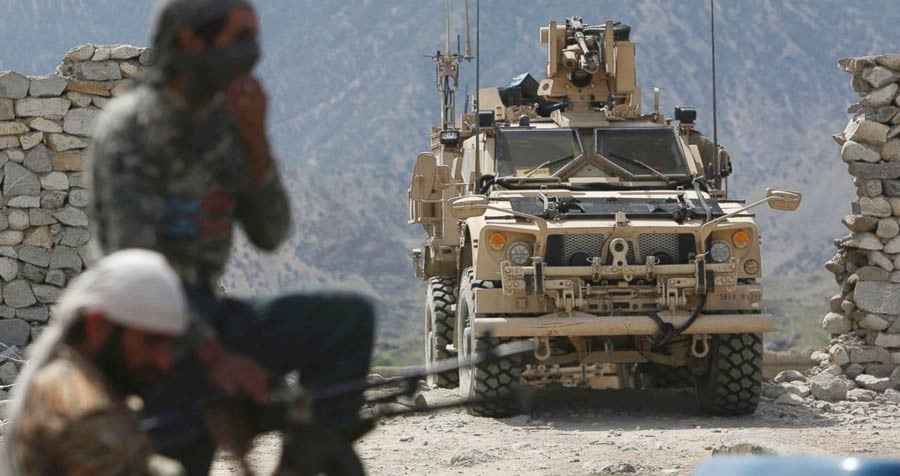
A proxy battlefield for geopolitical rivalries waged by a range of contending states with competing interests, Afghanistan needs new policies

On June 6, the 23 nations gathering in Kabul, officially dubbed as Kabul Process, had a confounding sense of déjà vu. Characteristic of Afghan leaders, President Ashraf Ghani’s accusation of Pakistan waging "an undeclared war" against Afghanistan missed the complete spectrum of existing realities in the country. In fact, Afghanistan is a proxy battlefield for geopolitical rivalries waged by a range of contending states with competing interests.
What destabilises Afghanistan and how to stabilise the country? I argue that there are compatibility and incompatibility of interests within and between two emerging groups of regional and international states in Afghanistan. The incompatibility of interests within and between these two groups of states is destabilising the country. On road to stability, the US’s behaviour is the key to determine whether Afghanistan will or won’t stabilise.
China, Central Asia Republics (CARs), Iran, Pakistan and Russia are all arrayed against Islamic State Khorasan Province (ISPK), treating the militant Islamist entity as the threat to stability in Afghanistan and the neighbouring states. Seeing Taliban as a counterweight to ISPK, they all but China have been accused of supporting the Islamist militia for the last couple of years. This arrangement also serves the interests of Taliban because the ISPK is also fighting the militia.
For Beijing, the security of its One Belt One Road (OBOR) project necessitates the support of Taliban who occupy large swathes of territories in rural Afghanistan. Similarly, since China, CARs, Iran, Pakistan and Russia have identical interests in stemming the flow of narcotics and Islamist extremism and the influx of refugees from Afghanistan, they see in Taliban a stabilising force in areas that are outside the control of Afghan government.
The convergence of interests among CARs, China, Iran, Pakistan and Russia is the indication of the US’s failure to stabilise Afghanistan. The seeming consensus among these players is that the US’s prolonged stay in Afghanistan, without pacifying the country, is a pretext and means to contain rising China, restrict assertive Russia, curtail Iran’s nuclear ambition and rollback Pakistan’s nuclear weapon programme. Nonetheless, fraught with risk, this marriage of convenience is untenable in the long run.
In the 1990s, CARs, Iran and Russia supported the Northern Alliance in its fight against the Taliban. Likewise, China was concerned about Taliban’s shelter of its Muslim Uighur militants from Xinjiang region. Except Pakistan, rest of the regional countries, due to fears of revival of Islamist extremism, won’t want to see Taliban to rule Afghanistan again.
Interests converge and diverge between the contending groups. Considering the fact that the US, India and Afghan government also treat ISIS’s Afghan chapter as a common enemy, it has common interests with CARs-China-Iran-Pakistan-Russia group. Nevertheless, in the broader picture, there is a conflict of interests. The US, India and Afghan government consider Taliban as a more serious threat in Afghanistan than ISPK, which they seemingly believe as a transitory danger.
As India’s presence in Afghanistan is meant to encircle Pakistan and rival China as a regional power, Taliban, being pro-Pakistan and anti-India -- as the militia’s short rule stood as testimony to the effect -- do not suit Delhi’s interests. Kabul’s interest is a stable Afghanistan as guaranteed by the central government in a way that no non-state actor, Taliban or ISIS, is in a position to threaten the centre’s writ.
Based in Afghanistan, the US’s interests range from neutralising global jihadist groups such as al-Qaeda and ISIS to market Central Asian oil and gas resources to containing China and restricting Russia and monitoring Iran’s nuclear ambition to ceasing Pakistan’s alleged spewing out of nuclear technology. These interests serve the US’s overarching goal of preventing the rise of any single powerful state that dominates Indo-Pak-Afghan region.
Seeing in Beijing a peer competitor in the region, Washington shares common interest with Delhi to obviating the rise of China. On Taliban, the US considered them as a threat only because they sheltered global jihadists such as Bin Laden who threatened American security.
The resurgence of Taliban and the emergence of ISPK show that a continuing but "managed instability" serves to justify American presence at the court of Kabul. Washington policy entails neither to eliminate Taliban nor allow them to control urban centres, reducing the militia to holding sway in rural areas. The US’s dubious policy of playing both ends against the middle has served as an impetus to regional states to bank on Taliban in order to secure their goals. To recap, preceding paragraphs have set out to establish that tensions within and between two emerging groups of states are destabilising Afghanistan.
How to stabilize Afghanistan?
The US’s policy will determine how events will evolve in Afghanistan. As a "global policeman," Washington is presumably interested in retaining bases in Afghanistan. By 2012, the country had 750 bases throughout the world as per Al Jazeera’s report. The US should be accommodated through an agreement with Kabul in return for Afghanistan’s security and state building.
Secondly, the only player that has the capacity to undo the whole scheme is Pakistan whose interests lie in Taliban as a powerful stakeholder in Afghanistan and a guarantee that Delhi won’t be allowed to use Afghan soil against Islamabad’s ‘national interests’.
Thirdly, Taliban should be allowed to operate as a political party. One eventuality that Afghanistan’s neighbouring and regional states, except Pakistan, don’t want is the ascendance of Taliban as the only power in Afghanistan is inbuilt in such an arrangement.
No state, except the US, would get what it craves for but every state would get what it could realistically have! Uneasy though, this is a pragmatist approach to stability in Afghanistan. Will Uncle Sam listen to reason?